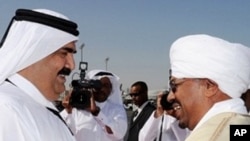Will the recent ceasefire agreement between Sudan’s Khartoum government and the most powerful rebel group in Darfur, the Justice and Equality Movement (JEM), truly result in peace in the war-torn Darfur region? Ambassador David Shinn, former U.S. Ambassador to Burkina Faso and Ethiopia and Colin Thomas-Jensen, Policy advisor for the Enough Project at the Center for American Progress share varying degrees of skepticism.
|
Ambassador David Shinn (left), and Colin Thomas-Jensen (right)
|
Mr. Jensen initially thought that the ceasefire agreement was a significant development due to the improved relations between Sudan and Chad. However, the JEM has expectations that far exceed Khartoum’s willingness to negotiate, he says. Ultimately, Mr. Jensen believes that Khartoum wants a military solution to the conflict. Ambassador Shinn disagrees saying that “Khartoum doesn’t want a military solution, but a resolution that favors the government.”
Regarding the truce between Chad and Sudan, both men agree that disregarding the direct conflict with rebel groups will not “wish away” the countries’ own respective rebellions. Ambassador Shinn adds that even if a successful agreement is made, there are still internal problems in Darfur because of the many independent rebel groups. “Until you can deal with them, you haven’t resolved the basic problem,” he says.
“We’re entering into what’s going to be the most important and most volatile year of Sudan’s history since independence,” says Mr. Jensen, referring to the upcoming April election—the first in 26 years. And in January 2011, the Southern Sudanese are to vote in a self-determination referendum, which he maintains will cause Sudan to split in two. Furthermore, because of other fissures, Ambassador Shinn believes that the January voting may result in Sudan splitting into more than two parts.
In the run-up to the April election, both men expect violence and a decline in security. While numerous international NGO’s do not think that Sudan is ready for the election for this very reason, Ambassador Shinn says that “it’s better to risk an election that is not very good than to not have it at all.”
The United States has offered incentives and punishments in exchange for Khartoum’s cooperation on the election, implementation of the North-South peace agreement, and pursuing peace in Darfur. However, there is no consensus within the U.S. government about the direction of Sudan policy. Different actors advocate different course of action. “It’s really up to President Obama to at some point, to make a decision as to which way to go with this” Ambassador Shinn concludes.
Listen to the full interview here Windows Media MP3










